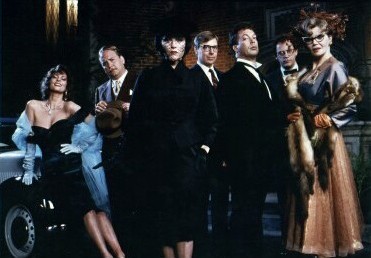 I’ve been meditating on the differences of the murder mystery parody films Murder By Death (1976), a classic of the genre and an old favorite of mine, and Clue (1985), a parody also referential to, but not really based on, the eponymous classic board game (which is known in some geographical areas as Cluedo). A collection of people, using for the evening the nom de plumes of various suspects from the classic game, are invited to a dinner party at an appropriately stately mansion in the Virginia countryside. Colorful, resentful, jaded, it soon comes out that they all seem to have something to hide; even the butler, Wadsworth, appears to be secretive when it comes to the motivations of this dinner.
I’ve been meditating on the differences of the murder mystery parody films Murder By Death (1976), a classic of the genre and an old favorite of mine, and Clue (1985), a parody also referential to, but not really based on, the eponymous classic board game (which is known in some geographical areas as Cluedo). A collection of people, using for the evening the nom de plumes of various suspects from the classic game, are invited to a dinner party at an appropriately stately mansion in the Virginia countryside. Colorful, resentful, jaded, it soon comes out that they all seem to have something to hide; even the butler, Wadsworth, appears to be secretive when it comes to the motivations of this dinner.
But when the host, Mr. Boddy, arrives, we discover that all of the guests have one thing in common: they’re being blackmailed by Mr. Boddy. Soon enough, Mr. Boddy ends up dead in a dark room, and the guests find themselves in a heated chase after who among themselves might have offed their heartily disliked host.
References to the board game include the various weapons available to commit the murder, certain information presented in envelopes, and perhaps the secret passageways, but wherein Clue, as I recall, functioned as a lesson in deductive logic, the movie is more about the colorful personalities, the tropes of the era when the movie was made, and the energetic performance of Tim Curry as Wadsworth, the butler. It doesn’t really offer an ending, but rather three, from which I suppose you may pick whatever suits your emotional self.
The failure to offer a definitive, although I do not mean unambiguous, ending may be one of the contributors to my ambivalent feelings about this story. After all, an ending offers an underline to the theme of the story, and when there are three endings, even if one is marked “But this is the real ending,” it makes it a bit difficult to draw any sort of lesson.
Which isn’t to say I disliked the movie. It’s well acted, has some clever patter, and the crime is not completely unbelievable in motivation or execution. Like its aforementioned predecessor, Clue abounds in absurdities, but they are less tightly bound to the murder mystery genre, and perhaps it’s that failure to implicitly critique its subject that makes it less fun; indeed, some of it is merely sexist humor (such as when Colonel Mustard begins to pat down Ms Scarlett in response to her exclamation of “Search me!”), or references to the unacceptability of homosexuality, which marks the movie as dated.
But an integral part of the success of Murder by Death was its parody of the guests, who are analogs to famous fictional detectives and their side-kicks. They are legends of the genre, and to discover, for instance, that the Charlie Chan analog, the Chinese Sidney Wang, dislikes his adopted Japanese son, is a play on Chan’s affectionate use of his son, whatever the number, during his fictional investigations – it brings a certain dark humanity to a character which otherwise seemed incapable of negativity. This is where Clue cannot compete, because Colonel Mustard, Mr. Green, et al, do not have histories to target to any effect. They are simply names on pasteboard.
So, despite the restrained and entertaining frenzy of Tim Curry’s Wadsworth, Clue’s attempt at an affectionate and memorable slap of the murder mystery genre isn’t as effective as that of its predecessor.




